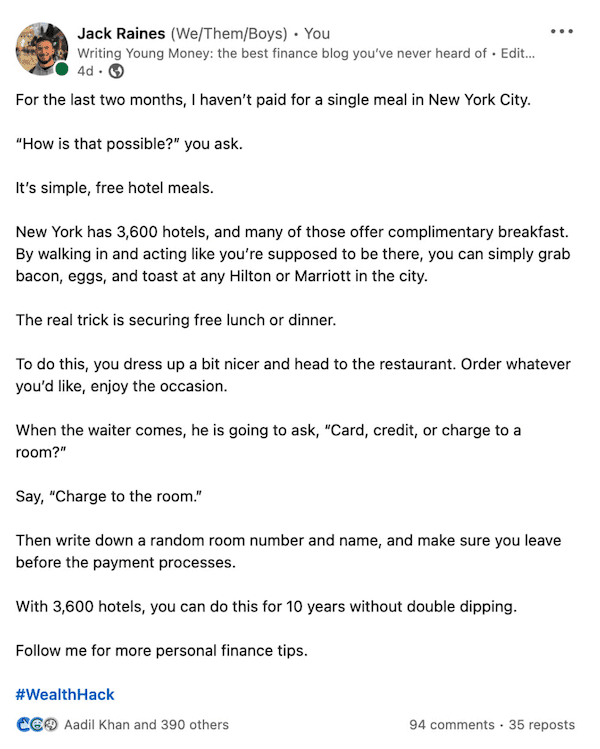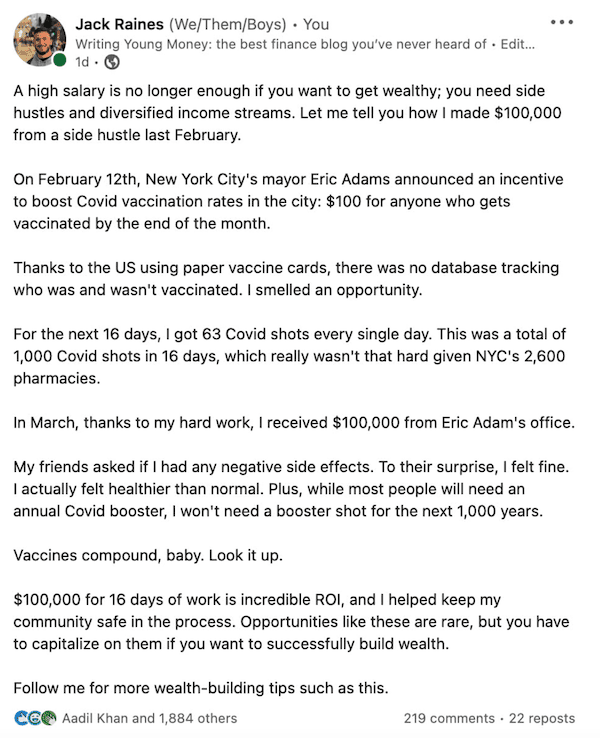I’ve been a LinkedIn fanboy since 2014.
My wife hates my love for the platform. She thinks it’s peak cringe which makes me, I dunno, cringe.
I’m about to be a dad so I’m cool with being cringe. I’ll be the dude rolling up to kiddo’s school with Dr Dre’s Next Episode song pumping out the mini-van subwoofer.
Why not?
Recently, there was an odd social experiment I came across on LinkedIn. This is absolutely fascinating and will help you understand humans better, which will explain a lot of weird stuff you see online and at work.
Workplace culture explains how LinkedIn became what it is
Most people don’t understand LinkedIn. As a power user of the platform, let me explain.
LinkedIn used to be just your digital resume. Now every conversation that happens in office hallways, meeting rooms, on Zoom calls, or by the good old fashion water cooler also happens on LinkedIn in digital form.
If you’ve worked 9–5 jobs for most of your career like I have, you’ll know workplace conversations are cringe at the best of times. Few people swear or say what they think because HR will fire them.
Conversations are long-winded and often drowning in buzzwords so employees can attempt to sound smart. Why?
Access to bonuses, promotions, and pay rises.
So what most workplaces resemble is a bunch of passive-aggressive adults trying today not to step on the toe connected to the ass on a person they might have to kiss tomorrow.
LinkedIn users are professionals — that’s code for no jokes, satire, politics, or social justice talk here, thanks!
But mention a career event, like a new job, and your LinkedIn notifications will become a sea of red. Strangers you don’t even know will kiss your butt to look good in front of their bosses.
The man who decided to conduct a strange LinkedIn experiment
Jack Raines is a fellow online writer I respect. Recently I noticed him doing something strange. He wrote long posts that read like interesting stories. I became captivated by them.
Only towards the end did I notice something was off.

Screenshot by author
The reaction from roughly 10% of LinkedIn users who read this was odd.

Screenshot by author (original post)
The next post Jack wrote took things up a notch to see who was paying attention to his experiment.

Screenshot by author (original post)
What makes it believable is he adds math to the post. But 10% of LinkedIn users still didn’t get this story either.

Screenshot of comments by author (original post)
The controversy around the bat virus and use of government funds helped to elevate Jack’s bad reputation.
Naturally Jack followed this post up with a GoFundMe campaign for Mark Zuckerberg, due to his tragic loss of wealth. His strategy became “make bad ideas sound genius.”
Why obvious fake stories get taken as gospel on LinkedIn
The average LinkedIn user over-calibrates for professionalism because they’re Hollywood acting for the colleagues, bosses, suppliers, and customers who pay their salary.
There’s nothing wrong with this, but it’s worth understanding the incentives at play so the reality makes sense. Jack describes LinkedIn as a form of performance.
“No one dares break character.”
He says LinkedIn could be described as a platform of conformity. This explains why most LinkedIn users don’t call out Jack’s posts as fake stories or satire. It’s the same reason we don’t trash ideas in meetings even if we think they suck ass. It’s conformity. It’s maintaining status-quo.
To call out Jack on LinkedIn for his shenanigans would be negative. It would be unprofessional. It could harm one’s future job prospects.
We’re 4000-year-old apes after all. We wouldn’t dare risk food or shelter.
Cringe posts work on Linkedin because it’s seen as positive and doing the right thing. Gotta been seen to be doing something, otherwise are you really working? It’s thought leadership and that has to be a good thing, right?
Those who dislike the cringe posts or see satirical posts like Jack’s, say nothing and watch the show (the same way they would in meetings).
When Jack realized all of this he unleashed his experiment. What if he leaned into cringe to see if anyone would break character?
The unexpected results
Jack didn’t think for a second anyone would believe he had 1000 shots of a bat virus vaccine in 16 days.
But 10% did believe his post.
This is what led one cranky Karen to tag Jack’s university and his lecturers. She wants him canceled for stealing and making money illegally. Another user even tagged the mayor of New York to let him know Jack got too many vaccines paid for by taxpayers.
Without satire posts on LinkedIn, everything is taken as the truth (the same applies in the workplace). When that truth is bad it leads a small percentage of users to think the post is dangerous.
That makes the entire experience an inside joke for the majority who get it, and a serious offence requiring police intervention for those who don’t.
The 10% who didn’t get the joke called out Jack because they urgently wanted to feel something. They wanted to get high on moral outrage. They wanted to be superior leaders amongst a larger audience of business folk.
By calling out Jack they look smart. Again, this doesn’t only happen on LinkedIn. They do it in the workplace too.
Jack nailed the paradox perfectly with this quote:
The irony in this whole thing is that by expressing your moral outrage at a piece of obvious satire, you show your network that you are, in fact, someone who expresses moral outrage at obvious satire. A self-dunk, so to say.
What this all means for you
LinkedIn is a kickass platform to use.
Don’t let this story and social experiment put you off. Every platform has its quirks and that’s okay.
The trick here is not to become a Karen and call out cringe content as if you’re the LinkedIn police. That will never get you hired or cause someone to reach out with a new opportunity.
Just unfollow bad content and follow creators of good content. Pretty soon your LinkedIn newsfeed will be full of useful posts.
LinkedIn can create new opportunities for you and that’s the whole point.
And hey, if you want to publish a few satire posts here and there, I won’t get mad. The lesson from the Jack Raines social experiment is we need more humor in the world (especially with professionals on LinkedIn).


